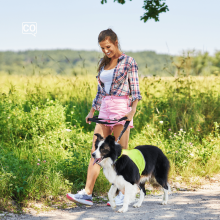Pasear (to walk) - Subjuntivo pretérito perfecto, subjuntivo (Subjunctive past perfect, subjunctive) - Spanish

Pasear - Conjugation of to walk in Spanish: Conjugation table, examples and exercises in the subjunctive past perfect, subjunctive tense (Subjuntivo pretérito perfecto, subjuntivo).
Subjuntivo pretérito perfecto, subjuntivo (Subjunctive past perfect, subjunctive)
All conjugations and tenses: Pasear (to walk) - conjugation and tenses - (Spanish)
Syllabus: Spanish lesson - Cuidando a la mascota (Taking care of the pet)
Conjugation of to walk in Subjuntivo pretérito perfecto
- yo haya paseado I have walked
- tú hayas paseado you have walked
- él/ella haya paseado he has walked
- nosotros/nosotras hayamos paseado we have walked
- vosotros/vosotras hayáis paseado You have walked
- ellos/ellas hayan paseado they have walked
Example phrases
- Es posible que yo haya paseado por el parque esta mañana. It is possible that I have walked in the park this morning.
- Dudo que tú hayas paseado solo por la ciudad. I doubt that you have walked around the city alone.
- No creo que él/ella haya paseado tan lejos antes. I don't think he/she has walked so far before.
- Es probable que nosotros/nosotras hayamos paseado juntos el verano pasado. It is likely that we walked together last summer.
- Me sorprende que vosotros/vosotras hayáis paseado tanto tiempo. It surprises me that you have walked for so long.
- No es cierto que ellos/ellas hayan paseado por aquí. It is not true that they have walked around here.
Exercise: Conjugate the verbs - pasear (to walk)
Instruction: Choose the correct word, read the sentence out loud and translate.
Show answers Show translationPasear (Subjuntivo pretérito perfecto, subjuntivo)
1. No es cierto que ellos/ellas ... por aquí.
2. Es probable que nosotros/nosotras ... juntos el verano pasado.
3. Es posible que yo ... por el parque esta mañana.
4. Dudo que tú ... solo por la ciudad.
5. No creo que él/ella ... tan lejos antes.
6. Me sorprende que vosotros/vosotras ... tanto tiempo.